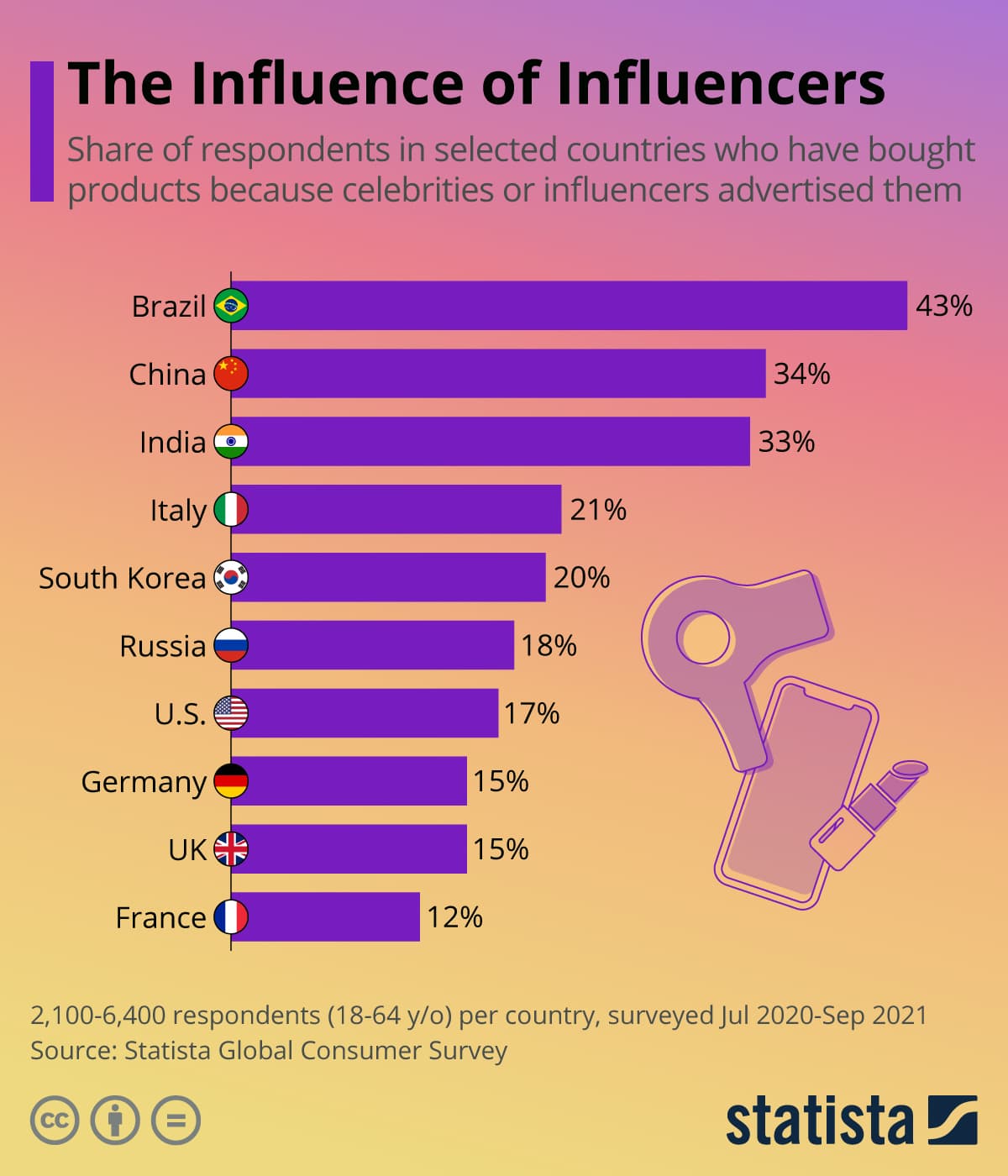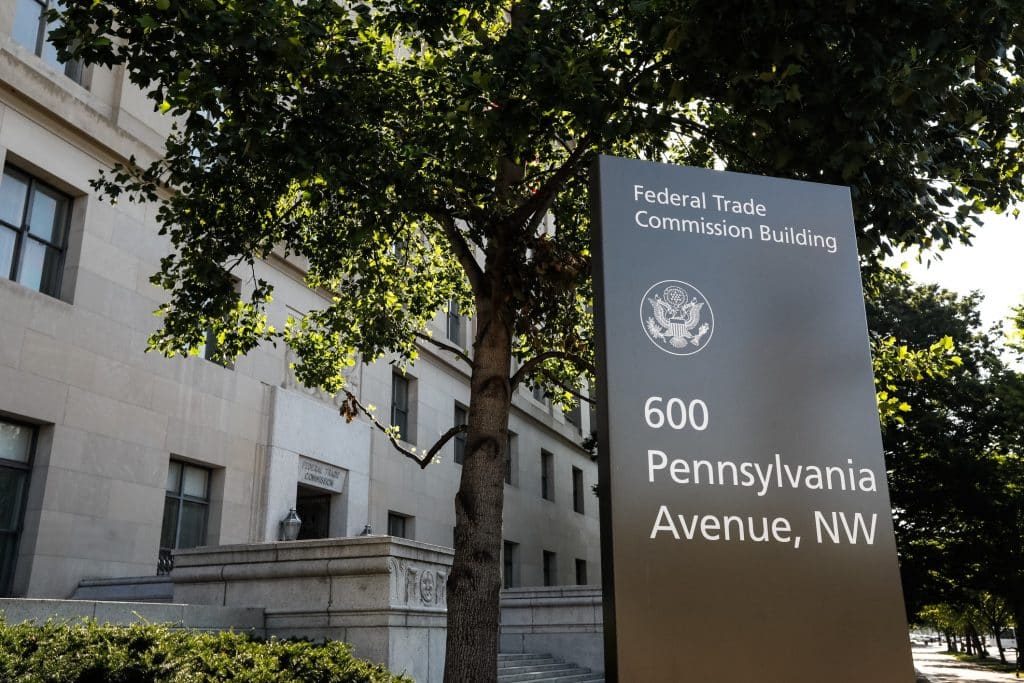FTC Guidelines for Influencers and Brand Owners

If you’re an ecommerce brand, you’ve probably looked at paying influencers or other content providers to promote your products.
It’s fairly straightforward to create and share sponsored content, but do you know you can get in trouble for it? Cardi B almost did, and so did Jordin Sparks.
In this article, we’ll discuss the do’s and don’ts when posting ads or asking someone else to promote your products so you won’t get in trouble with the government.
Contents
The Rise of Influencer Marketing
As of January 2021, 72.3% of internet users in the United States visit social networking sites. And according to Statista, 17% of US consumers buy products because of influencers.
 Source: Statista
Source: Statista
This is not surprising because marketers know that in order to increase engagement, you need to place your ads in front of your desired audience. And in this day and age, that’s online.
This is why brands are more than willing to reach out to content creators such as Charli D’Amelio and Lele Pons. They can charge close to $200,000 per post, but marketers know they’re able to reach millions of loyal followers.
Many ecommerce business owners rely so much on PPC ads to sell more products. However, with the increase of PPC costs, driving external traffic to your sites and listings is not only important, it’s necessary.
Related Reading: Advanced Amazon PPC Advertising Strategies
Influencer marketing allows you to drive external traffic to your website and listing. And you’re more likely to get high-quality leads using this method because your products have already been recommended by someone customers trust.
The Federal Trade Commission Is Responsible for Consumer Protection
If you want to know what is and is not allowed when it comes to posting ads and sponsored posts online, you should look to the Federal Trade Commission (FTC). If you’re not so familiar with the body, it’s the one that pressured Amazon to ban large Chinese sellers for using fake reviews earlier this year.

The FTC has two missions: (1) protect consumers and (2) promote competition. It covers almost every area of commerce with some exceptions, such as banks, common carriers, and insurance companies. But it’s definitely responsible for protecting consumers when it comes to online sponsored ads.
To fulfill its missions, the FTC has the power to investigate and prevent deceptive acts and practices in commerce. So when an influencer posts about how effective a product is without actually using it, it’s the FTC that looks into it.
So what exactly does the FTC require for sponsored content?
The Commission has published an Endorsement Guide that gives examples of scenarios where brands and influencers can get into trouble and how to address them. We’ll summarize the salient points in the following sections.
Are My Posts Covered by the FTC?
Before we get into the do’s and don’ts of posting ads, let’s first determine if you can be held liable under the FTC Act.
Here’s the test: material connection to the advertiser. If you have it, you’re covered. If you don’t, then you’re not. But what exactly is a material connection under this context?
According to the FTC, material connection “means any relationship that might materially affect the weight or credibility of any representation or endorsement and that would not be reasonably expected by consumers.”
Material connection includes the following relationships:
- Personal
- Family
- Employment
- Financial
| Note: Throughout this post, the term “influencer” is used. Take note that even the FTC does not expressly define the term. As used in this article, the term “influencer” encompasses not only well-known celebrities or people with a significant number of followers but includes those that have material connections to the advertiser. |
|---|
A financial relationship doesn’t only cover cases when an influencer is actually paid by an advertiser. It can also include
- Receiving free products
- Getting discounts in exchange for the promotion
- Getting free travel and accommodation
- Other similar arrangements
The FTC also covers aspirational endorsements, such as when a company pays influencers to say they want to buy a certain product without actually buying or trying the product out.

If you don’t have a material connection with the advertiser, such as when you posted a positive review of a product you paid for yourself without the brand asking you to do so, then the content you posted is not covered by the FTC. It’s also not covered if you got the product because a store is giving out free samples and there’s no expectation that you should publish a review.
Now how about influencers outside the US?
While the FTC is a federal agency in the United States, influencers from other countries may also be covered, given that the content may be seen by and can affect US consumers. Also, there may be similar laws in other countries that influencers also have to consider.
Influencers Who Have a Material Connection with Advertisers Need to Disclose Their Relationship
Once you have a material connection with the brand, e.g., you’ve been paid to promote a product or you’re employed by the company, you need to disclose your relationship in your sponsored posts.
The reason behind this is obvious: Without this disclosure, consumers may be misled.
And it doesn’t even have to mislead all of your audience. Under the law, content is deceptive if it misleads a “significant minority” of consumers.
There are a couple of exceptions to the disclosure rule:
- If every person viewing the post knows it’s an ad
- If it’s well-known that a certain influencer is an ambassador or spokesperson of the company
However, investigations are done on a case-by-case basis, and it can be quite hard to determine whether people know a post is an ad without the disclosure or that followers know an influencer has a material connection with the advertiser. To be safe, follow this rule: When in doubt, disclose.
So influencers should disclose their relationship with the advertiser. But how should they do it?
How to Disclose Sponsored Content
To determine if a disclosure is sufficient and compliant with FTC’s guidelines, we’ll look at three areas: language, placement, and content.
Acceptable Language in Online Ads
There’s no template mandated by the FTC to make sponsored ads compliant with the law. It only requires that disclosures should be clear and conspicuous and should be in plain and unambiguous language.
This means that it shouldn’t take a reasonable consumer to figure out the material connection that exists between the influencer and the advertiser. Here are a couple of examples that the FTC does not consider enough disclosure.
Language Considered Insufficient by the FTC
- A single disclosure on the homepage of a blog that many of the products discussed on the site are provided free by manufacturers
- Saying in your profile or homepage that you are an employee of the company without disclosing the same in the actual post
- Simply thanking the company without saying it’s a sponsored post or that your received the products for free
- Saying the company asked you to try their product without disclosing you were paid, when you actually were
- Simply adding an affiliate link or Buy Now button
- Ambiguous hashtags such as #sp, #spon, #partner, #ambassador, and #collab (but the FTC considers it enough to include the company name in #ambassador such as #Nike_Ambassador)
- Including the word “ad” as part of the hashtag, such as #NikeAd (this makes it hard for readers to determine that it’s sponsored)
- Saying Company X gave you products to give away without mentioning you also received free products you get to keep or that you are paid or sponsored by the company
- Using features from social media platforms that indicate it’s sponsored content such as Youtube’s “Includes paid promotion” label.
- Putting a disclosure in a different language than the endorsement
From dissecting the rules above, you can see that many influencers and brands are guilty of violating the FTC rules. One of the most guilty infringements is on affiliate sites that have a single affiliate disclosure buried at the bottom of their home pages. We’ll address where these disclosures should occur, because placement is everything.
Where Should You Place Disclosures?
Even if you got the language right, it isn’t enough. The FTC puts great emphasis on the placement of disclosures because if the consumers can’t see them easily, they can still be misled.
So where and how should you put disclosures? The most important rules are summarized in the table below.
| Placement of Disclosures in Sponsored Content | |
|---|---|
| Videos | Mention that the content is sponsored both in the video as well as in the description. The disclosure should also be made at or near the beginning of the video. |
| Posts with expandable descriptions | Some social media platforms break a long post so readers can easily see the comments section. In these cases, the disclosure should be placed at the beginning, where it can be seen without requiring readers to expand the description. |
| Snapchat or Instagram stories | Superimpose the disclosure on the videos or images. |
| Hyperlinks | Consumers need to see the disclosure without having to hunt for it. So including the disclosure of the material relationship on a hyperlink isn’t enough. However, complex disclaimers can be hyperlinked as long as the hyperlink is easily seen. |
| Streams, or longer videos | It’s easy to miss disclosures on longer content such as video streams. The FTC suggests repeating the disclosure regularly. There’s no hard-and-fast rule as to how many times this should be done, so the best way to be compliant is to have an indicator that the content is sponsored by a particular company or brand. |
In addition to these rules, the disclosure should be
- In a font that is easy to read
- In a shade that stands out against the background
- When in audio form, must be loud enough to be heard easily
Product Reviews and the FTC
Again, the FTC doesn’t want consumers to be misled and product reviews are a big focus of their attention. When it comes to product reviews, influencers and content creators are not allowed to do the following:
- Talk about their experience with a product they haven’t tried yet
- Give a dishonest review
- Make claims about a product without proof
- Claiming results that may be interpreted to mean that the same results should be expected on average
Once again, we can see many potential landmines faced by brands and influencers. Many review sites are guilty of giving reviews and rankings of products they haven’t actually used. Moreover, the greater attention given to fake product reviews is at least part of the reason that Amazon has recently come down very hard on sellers guilty of systematic review manipulation.
What Are the Consequences When Brands and Influencers Don’t Follow FTC Rules?
The FTC Act gives the Commission authority to seek relief for consumers. This can be done through injunctions and restitution, and in some cases, civil penalties.
The consequences vary, depending on the violation.
For example, while posting ads of a product, some influencers failed to disclose their material connection to the advertiser, prompting the FTC to send warning letters to them. In this case, they were reminded of their responsibilities as influencers and were asked to submit a written response, describing the actions they will take to ensure that proper disclosure will be observed in their future posts.

In the 2020 case of LendEDU, on the other hand, the company was ordered to pay the FTC $350,000 for posting fake reviews. These reviews were made by their own employees as well as their friends and family.
In general, the FTC doesn’t monitor individual influencers to police their posts. However, it’s better to err on the side of caution and just follow the rules.
Consider Other Laws and Your Platform’s TOS
The FTC has a huge role when it comes to sponsored content. However, business owners should also consider other laws and their platform’s Terms of Service that may be violated by influencers. Being banned from Facebook or Amazon is often a more real consequence than FTC action.
Amazon has a Seller Code of Conduct which specifically addresses how reviews can be solicited and given. Amazon also changed their policy regarding product rebates, which they deem as being manipulative of their search algorithm. Facebook, and most other platforms, have similar guidelines for various things governing paid advertising and organic posts.
Conclusion
The ultimate goal of these laws and guidelines is to protect consumers from being deceived. Brands can increase revenue through false advertising, but there’s much to be said about honesty and transparency.
Customer loyalty boils down to how good your products really are and how much you value your customers’ trust.
Have you worked with influencers before? Do you make sure they disclose their relationship with you as an advertiser? Feel free to comment below.




